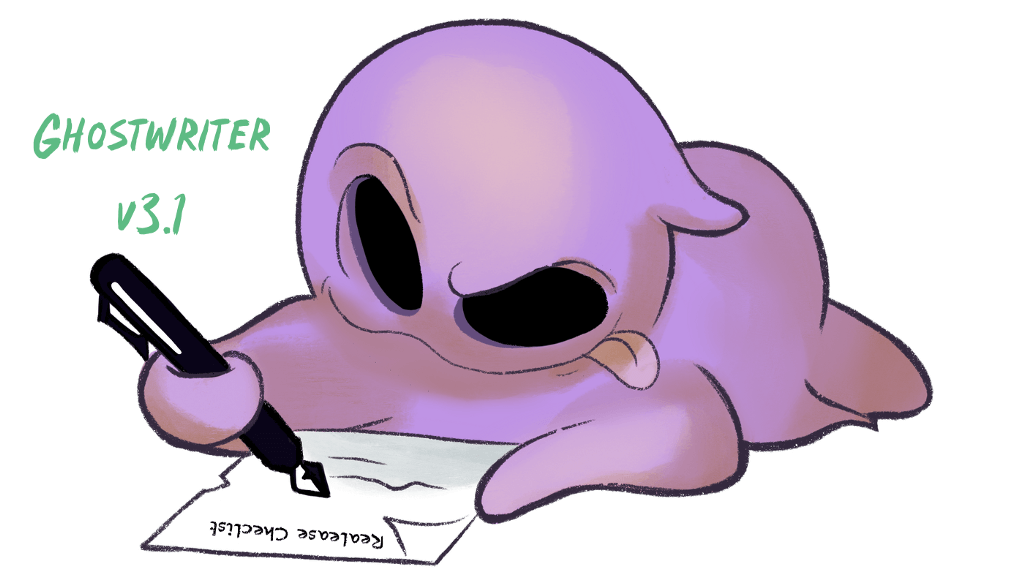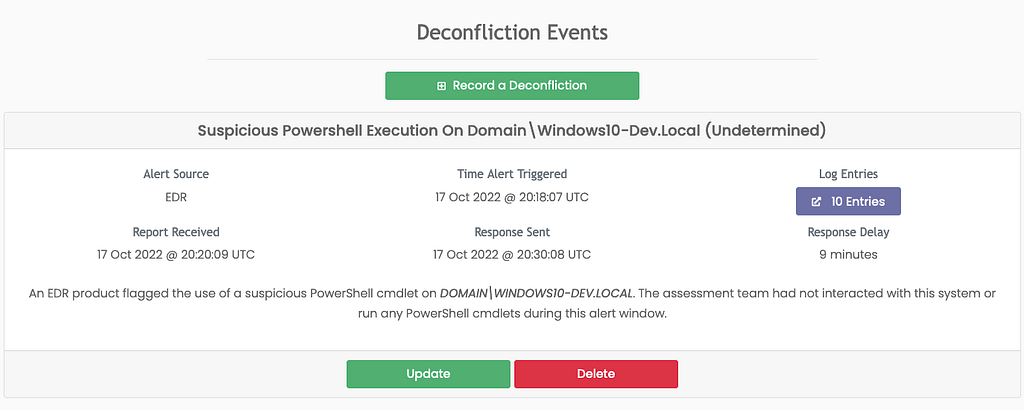Ghostwriter v3.1 Now Available
Oct 19 2022
By: Christopher Maddalena • 5 min read

Ghostwriter v3.1 is now available! This release introduces several new features along with a host of minor improvements. This post will look at the most significant changes, starting with a pair of new tabs on the project dashboard.
Deconfliction Tracking
When performing any offensive assessment work, you are likely to trigger an alert or generate anomalous logs that will get someone’s attention. If the system owner cannot identify you as the source, they will likely reach out to you to deconflict the event.
You can now record deconfliction events under a project’s Deconflictions tab. Each recorded event appears as a card, like so:

Deconflictions are time-sensitive. Delayed or inconclusive responses can mean wasted effort and frustration for defenders. Events like these are why activity logging is critical. Each deconfliction card tracks a few key pieces of information and light metrics.
You can learn more about how Ghostwriter makes activity logging simple and easy here: https://www.ghostwriter.wiki/features/operation-logs

Once you have responded, you can update the status to reflect if the event was or was not related to your work, and the card will show how much time has passed between receiving the deconfliction request and the final response.
This data helps you and your client keep track of these events, but it can also reveal potential gaps and weaknesses in monitoring strategies. For example, suppose several hours have passed between the alert timestamp and the client contacting you. In that case, that could indicate defenders not receiving timely notifications or dealing with a lot of noise and a backlog of notifications.
A careful review of deconfliction events before a post-assessment debrief call can offer interesting insights and topics of discussion.
White Card Tracking
The project dashboard also has a new White Cards tab for tracking project white cards. Like the term deconflict, white card comes to us from the U.S. military. It refers to “a simulated event in an operational test.” A client may issue a white card for various reasons, such as if a system is too fragile or critical to risk attempting to exploit it or if there is a need or desire to bypass exploitation due to time constraints.
The latter may be the most common white card. Today we commonly refer to assessments with this white card as “assumed breach.” With such a white card, the assessment begins as if the team has successfully exploited an external system or gained access or credentials through other means (e.g., phishing).
This white card and other simulated events must be documented and tracked. Each white card has a date and time the client issued it, a descriptive title or headline field, and a free-form field for more thorough or detailed descriptions.

These fields make it simple to include these in a Ghostwriter report template as a list or table of white cards.
System Health Monitoring
Finally, Ghostwriter administrations can now monitor health API endpoints. The primary endpoint is /status. This endpoint runs thorough tests against Ghostwriter’s critical services and monitors the host system’s available memory and storage. Thresholds for these checks are configurable via ghostwriter-cli.

Docker will also monitor container and service health. Running ./ghostwriter-cli running will return the status of your running Ghostwriter containers. The Status column will now show the health status of the container’s service.
The wiki has more information on how to configure health check options and suggestions for automated monitoring.
Wrap Up
These new features are just a few things we have added or changed in recent updates. We have also addressed several issues and requests submitted by the community. Here are a few highlights:
- Findings manually added to a report now appear with a flag to make it easier to identify new findings you may want to save to your library for future use.
- Any field editable with the WYSIWYG editor is now available as a styled RichText object in report templates.
- We expanded the totals key in report data to include the total number of findings in each severity category.
- Added a new scheduled task to monitor activity logs for current projects and send reminders if logs have been inactive for more than 24 hours (or any set number of hours).
As always, check the release CHANGELOGs for the complete list of changes. We plan to continue to expand on these recent changes and add more before the end of the year. For now, get the latest release here!
Releases · GhostManager/Ghostwriter
Ghostwriter v3.1 Now Available was originally published in Posts By SpecterOps Team Members on Medium, where people are continuing the conversation by highlighting and responding to this story.


